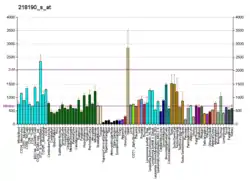UCRC
Ubiquinol-cytochrome c reductase complex (7.2 kD), also known as UCRC or UQCR10, is a human gene.[5]
Its gene product is a subunit of the respiratory chain protein Ubiquinol Cytochrome c Reductase (UQCR, Complex III or Cytochrome bc1 complex), which consists of the products of one mitochondrially encoded gene, MTCYTB (mitochondrial cytochrome b) and ten nuclear genes: UQCRC1, UQCRC2, Cytochrome c1, UQCRFS1 (Rieske protein), UQCRB, UQCRQ ("11kDa protein"), UQCRH (cyt c1 Hinge protein), Rieske Protein presequence, UCRC("cyt. c1 associated protein"), and UQCR ("Rieske-associated protein").
References
- GRCh38: Ensembl release 89: ENSG00000184076 - Ensembl, May 2017
- GRCm38: Ensembl release 89: ENSMUSG00000059534 - Ensembl, May 2017
- "Human PubMed Reference:". National Center for Biotechnology Information, U.S. National Library of Medicine.
- "Mouse PubMed Reference:". National Center for Biotechnology Information, U.S. National Library of Medicine.
- "Entrez Gene: UCRC ubiquinol-cytochrome c reductase complex (7.2 kD)".
Further reading
- Maruyama K, Sugano S (1994). "Oligo-capping: a simple method to replace the cap structure of eukaryotic mRNAs with oligoribonucleotides". Gene. 138 (1–2): 171–4. doi:10.1016/0378-1119(94)90802-8. PMID 8125298.
- Schägger H, Brandt U, Gencic S, von Jagow G (1996). "[7] Ubiquinol-cytochrome-c reductase from human and bovine mitochondria". Ubiquinol-cytochrome-c reductase from human and bovine mitochondria. Meth. Enzymol. Methods in Enzymology. 260. pp. 82–96. doi:10.1016/0076-6879(95)60132-5. ISBN 978-0-12-182161-6. PMID 8592474.
- Bonaldo MF, Lennon G, Soares MB (1997). "Normalization and subtraction: two approaches to facilitate gene discovery". Genome Res. 6 (9): 791–806. doi:10.1101/gr.6.9.791. PMID 8889548.
- Suzuki Y, Yoshitomo-Nakagawa K, Maruyama K, et al. (1997). "Construction and characterization of a full length-enriched and a 5'-end-enriched cDNA library". Gene. 200 (1–2): 149–56. doi:10.1016/S0378-1119(97)00411-3. PMID 9373149.
- Iwata S, Lee JW, Okada K, et al. (1998). "Complete structure of the 11-subunit bovine mitochondrial cytochrome bc1 complex". Science. 281 (5373): 64–71. Bibcode:1998Sci...281...64I. doi:10.1126/science.281.5373.64. PMID 9651245.
- Dunham I, Shimizu N, Roe BA, et al. (1999). "The DNA sequence of human chromosome 22". Nature. 402 (6761): 489–95. Bibcode:1999Natur.402..489D. doi:10.1038/990031. PMID 10591208.
- Zhang QH, Ye M, Wu XY, et al. (2001). "Cloning and functional analysis of cDNAs with open reading frames for 300 previously undefined genes expressed in CD34+ hematopoietic stem/progenitor cells". Genome Res. 10 (10): 1546–60. doi:10.1101/gr.140200. PMC 310934. PMID 11042152.
- Wistow G, Bernstein SL, Wyatt MK, et al. (2002). "Expressed sequence tag analysis of adult human lens for the NEIBank Project: over 2000 non-redundant transcripts, novel genes and splice variants". Mol. Vis. 8: 171–84. PMID 12107413.
- Strausberg RL, Feingold EA, Grouse LH, et al. (2003). "Generation and initial analysis of more than 15,000 full-length human and mouse cDNA sequences". Proc. Natl. Acad. Sci. U.S.A. 99 (26): 16899–903. Bibcode:2002PNAS...9916899M. doi:10.1073/pnas.242603899. PMC 139241. PMID 12477932.
- Gerhard DS, Wagner L, Feingold EA, et al. (2004). "The status, quality, and expansion of the NIH full-length cDNA project: the Mammalian Gene Collection (MGC)". Genome Res. 14 (10B): 2121–7. doi:10.1101/gr.2596504. PMC 528928. PMID 15489334.
- Guzy RD, Hoyos B, Robin E, et al. (2005). "Mitochondrial complex III is required for hypoxia-induced ROS production and cellular oxygen sensing". Cell Metab. 1 (6): 401–8. doi:10.1016/j.cmet.2005.05.001. PMID 16054089.
This article is issued from Wikipedia. The text is licensed under Creative Commons - Attribution - Sharealike. Additional terms may apply for the media files.




